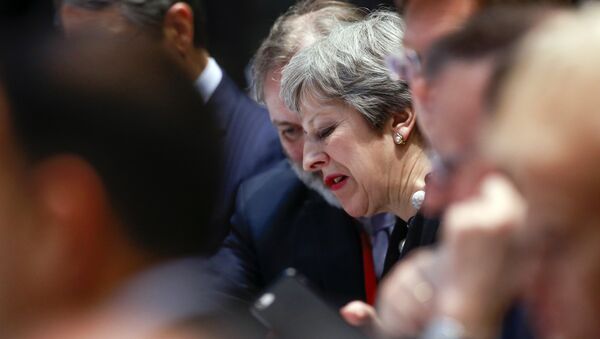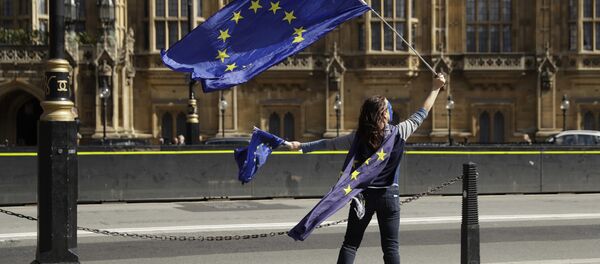Sputnik has discussed the UK government’s handling of Brexit with Gavin Barrett, a professor of European Constitutional and Economic Law at University College Dublin.
Sputnik: What are your thoughts on the recent comments by Crispin Odey, who is, of course, a major donor to the Conservative Party?
Gavin Barrett: Political parties do need donors to go about their business, to finance their activities, so I think the Conservative Party will certainly listen to what Crispin Odey has to say and respectfully, but donors don’t get to determine the party’s policies, they don’t get to choose the leadership of the party. That's for the members of the party as a whole and insofar as concerns confidence votes it is for the Conservative Party members of parliament. So it's significant as a barometer I think of how some of its wealthy supporters feel but I don’t think it really goes beyond that.
Sputnik: What do you think of the suggestion of Crispin Odey that the UK to start breaching EU rules and just go ahead and start pursuing independent trade deals, what kind of consequences would that have, how dangerous of a scenario is that?
Gavin Barrett: I don’t think that’s a very realistic prospect at all, I mean, there are two elements to this, one, that the UK should start breaching EU rules which are effectively a form of international law, and secondly, that they should pursue independent trade deals. Now in the first place, it is not a good idea for countries generally to go around breaking international law, because if they start doing that today then others can start doing that tomorrow, international relations generally depend on people reaching agreements and then adhering to those agreements, and you know, the UK is as aware of that as anyone else is, as any other international player, so I can’t see them going about their business by breaking rules.
READ MORE: Labour Leader Says PM May 'Too Weak to Stand Up' to US Amid Tariff Row
There’s a strong tradition as well of the rule of law in the United Kingdom and adhering to the rules. So the idea that they would go around unilaterally breaching commitments that they've entered at the international level is highly improbable, and the second point that Odey is making that the UK should now be pursuing independent trade deals and for the time being it would be illegal for the United Kingdom to do that. The second point about that is that it assumes that trade deals are out there to be had and there are a number of reasons why that’s not the case. One of them is that the United Kingdom has far less bargaining power then the European Union. It only has a population of about 60 million and European Union as a whole has a population of about half a billion. So you can imagine who would be first in line to get trade deals in that kind of a situation, it certainly wouldn’t be the United Kingdom and on top of that most countries outside the European Union are simply waiting to see what happens before they enter into trade deals with the United Kingdom because they won't know what they’re buying.
Sputnik: There’s also been this very sort of disturbing government study that says that Britain could actually face food and medicine shortages within two weeks of Brexit if a deal isn’t reached, what are your thoughts on that? Is that a realistic scenario and how frightening is that? Do you think it’s possible that a Brexit a deal will not be reached and there could be serious problems with the provision of the basics?
Gavin Barrett: The prospect of there being no deal at a substantive level it seems almost unimaginable that this would happen, the risks of it are so great, and yes we're still waiting for substantive British government proposals and particularly in relation to how they would maintain a frictionless border with the Republic of Ireland, their nearest neighbor and the European Union have made it plain that in the absence of such a proposals they’re not gonna reach an agreement with them. There are other areas of dispute as well, for instance, the rule of the European Court of Justice.
Sputnik: One of the biggest obstacles to reaching a deal of course is the situation with Ireland and Northern Ireland, what kind of solutions exist?
Gavin Barrett: There are two that of been put forward by the United Kingdom. I should explain that the border between the Republic of Ireland and Northern Ireland is virtually invisible in the sense that you can drive from the Republic to Northern Ireland without even knowing that you’ve crossed the border, there are no checks, there are no controls of any kind on the border, and of course trade relations with the Republican and Northen Ireland have been very good as a result of that, since that situation has come about in the last 20 years.
There are very few ways of doing that other than the United Kingdom or Northern Ireland, which is a region of the United Kingdom, the northernmost part of the island of Ireland, if it stays in the single market and stays to a large extent in the customs union. So one or other of them, but the problem with that is Theresa May's Brexit supporters don't want the United Kingdom as a whole to do that, and that Northern Ireland's unionists, upon whom Theresa May depends for support, don’t want Northern Ireland to stay alone in this situation and divorced from the rest of the United Kingdom economically in that respect.
The views and opinions expressed in this article are solely those of the speaker and do not necessarily reflect those of Sputnik.





